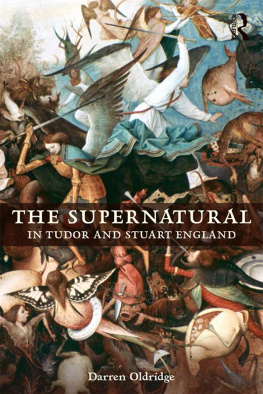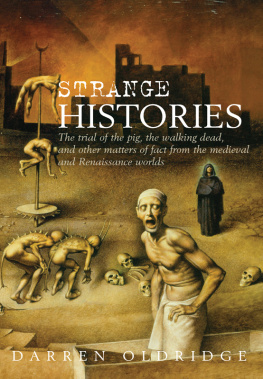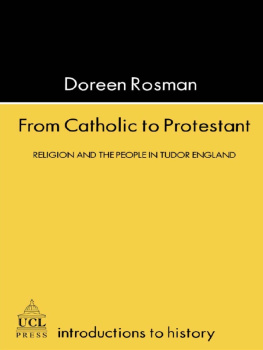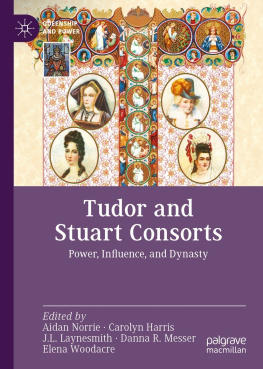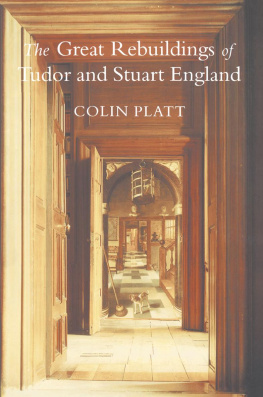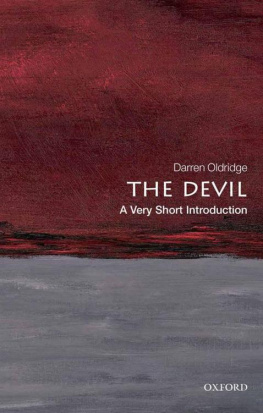Darren Oldridge - The Supernatural in Tudor and Stuart England
Here you can read online Darren Oldridge - The Supernatural in Tudor and Stuart England full text of the book (entire story) in english for free. Download pdf and epub, get meaning, cover and reviews about this ebook. year: 2016, publisher: Routledge, genre: Religion. Description of the work, (preface) as well as reviews are available. Best literature library LitArk.com created for fans of good reading and offers a wide selection of genres:
Romance novel
Science fiction
Adventure
Detective
Science
History
Home and family
Prose
Art
Politics
Computer
Non-fiction
Religion
Business
Children
Humor
Choose a favorite category and find really read worthwhile books. Enjoy immersion in the world of imagination, feel the emotions of the characters or learn something new for yourself, make an fascinating discovery.
- Book:The Supernatural in Tudor and Stuart England
- Author:
- Publisher:Routledge
- Genre:
- Year:2016
- Rating:5 / 5
- Favourites:Add to favourites
- Your mark:
- 100
- 1
- 2
- 3
- 4
- 5
The Supernatural in Tudor and Stuart England: summary, description and annotation
We offer to read an annotation, description, summary or preface (depends on what the author of the book "The Supernatural in Tudor and Stuart England" wrote himself). If you haven't found the necessary information about the book — write in the comments, we will try to find it.
Darren Oldridge: author's other books
Who wrote The Supernatural in Tudor and Stuart England? Find out the surname, the name of the author of the book and a list of all author's works by series.
The Supernatural in Tudor and Stuart England — read online for free the complete book (whole text) full work
Below is the text of the book, divided by pages. System saving the place of the last page read, allows you to conveniently read the book "The Supernatural in Tudor and Stuart England" online for free, without having to search again every time where you left off. Put a bookmark, and you can go to the page where you finished reading at any time.
Font size:
Interval:
Bookmark:

The Supernatural in Tudor and Stuart England reflects upon the boundaries between the natural and the otherworldly in early modern England as they were understood by the people of the time. The book places supernatural beliefs and events in the context of the English Reformation to show how early modern people reacted to the world of unseen spirits and magical influences. It sets out the conceptual foundations of early modern encounters with the supernatural and shows how occult beliefs penetrated almost every aspect of life.
Darren Oldridge considers many of the spiritual forces that pervaded early modern England: an immanent God who sometimes expressed Himself through signs and wonders, and the various lesser inhabitants of the world of spirits, including ghosts, goblins, demons and angels. He explores human attempts to comprehend, harness or accommodate these powers through magic and witchcraft, and the role of the supernatural in early modern science.
This book presents a concise, accessible and up-to-date synthesis of the scholarship of the supernatural in Tudor and Stuart England. It will be essential reading for students of early modern England, religion, witchcraft and the supernatural.
Darren Oldridge is Senior Lecturer in History at the University of Worcester. His previous publications include Strange Histories (2005), The Devil: A Very Short Introduction (2012) and (as editor) The Witchcraft Reader (second edition 2008).
First published 2016
by Routledge
2 Park Square, Milton Park, Abingdon, Oxon OX14 4RN
and by Routledge
711 Third Avenue, New York, NY 10017
Routledge is an imprint of the Taylor & Francis Group, an informa business
2016 Darren Oldridge
The right of Darren Oldridge to be identified as author of this work has been asserted by him in accordance with sections 77 and 78 of the Copyright, Designs and Patents Act 1988.
All rights reserved. No part of this book may be reprinted or reproduced or utilised in any form or by any electronic, mechanical, or other means, now known or hereafter invented, including photocopying and recording, or in any information storage or retrieval system, without permission in writing from the publishers.
Trademark notice: Product or corporate names may be trademarks or registered trademarks, and are used only for identification and explanation without intent to infringe.
British Library Cataloguing-in-Publication Data
A catalogue record for this book is available from the British Library
Library of Congress Cataloging-in-Publication Data
Names: Oldridge, Darren, 1966 author.
Title: The supernatural in Tudor and Stuart England / Darren Oldridge.
Description: London : Routledge, 2016. | Includes bibliographical
references and index.
Identifiers: LCCN 2015040289| ISBN 9780415747585 (hardback : alkaline
paper) | ISBN 9780415747592 (paperback : alkaline paper) |
ISBN 9781315640839 (e-book)
Subjects: LCSH: Supernatural. | EnglandReligion16th century. | England
Religion17th century. | EnglandSocial life and customs
16th century. | EnglandSocial life and customs17th century.
Classification: LCC BL100 .O43 2016 | DDC 130.942/09031dc23
LC record available at http://lccn.loc.gov/2015040289
ISBN: 978-0-415-74758-5 (hbk)
ISBN: 978-0-415-74759-2 (pbk)
ISBN: 978-1-315-64083-9 (ebk)
Typeset in Bembo
by Apex CoVantage, LLC
For Sharron
Among the papers of Elias Ashmole, the Restoration courtier and fellow of the Royal Society, is a spell to become invisible. The procedure is surprisingly simple: it involves soaking an anthill in water to produce a stone of diverse colours, which the magician should carry in his right hand. It is not known if Ashmole attempted this operation; but he was sufficiently impressed by its potential to copy out the instructions by hand, alongside notes on the conjuration of spirits, love magic, and charms to protect his property from thieves.
Modern readers might view Ashmoles projects as excessively ambitious. Many of his contemporaries would have regarded his magical experiments with concern, though for rather different reasons. Ashmoles attempts to raise spirits involved occult forces that were widely assumed to be both potent and real: these facts made such activities hazardous to would-be sorcerers, and problematic in the context of Protestant Christianity. Few doubted that the cosmos was penetrated with unseen powers, and the observable world was merely one part of a vast economy of the supernatural. The newly invented microscope, whose power to illuminate invisible wonders was championed by Ashmoles contemporary Robert Hooke, tended to confirm this view.
This book considers the supernatural assumptions that touched almost every aspect of life in sixteenth- and seventeenth-century England. One of its central themes is the attempt by English Protestants to establish a biblical model of the supernatural world, an enterprise that may be described as the reformation of spirits. This project was protracted and complex and richly unpredictable in its outcomes. Like Ashmoles plan to become invisible, my own attempt to chart this process combines considerable ambition with perhaps limited prospects of success. Nonetheless, it is hoped that readers will find the broad outlines presented here to be useful, and be led to more specialist texts for the detail that I have sometimes elided. Other scholars will fill the omissions that these pages contain. The current lively interest in all aspects of the supernatural in the early modern period makes me confident that this will be the case.
I have acquired innumerable intellectual debts in writing this book and hope that I have acknowledged them fully in what follows. Thanks are due to my friends, colleagues and students at Worcester, and the marvellous editorial team at Routledge. I am also grateful to the Scouloudi Foundation for their support for my archival research. My deepest thanks go to my partner, Sharron, whose magical attentions kept me safe as I wandered in the kingdom of spirits, and whose love fills me with happiness and wonder. This book is dedicated to her.
Bodleian Library, Oxford, MS Ashmole 1406, 97 r .
Introduction
To write a history of the supernatural is, inevitably, to reflect on the boundaries of the natural world and the forces that operate within it. When the alchemist Thomas Vaughan published in 1650 his history of magic, Magia Adamica, or, The Antiquitie of Magic , he was careful to distinguish between good and corrupted forms of the art: the former was a gift of God transmitted from the time of Adam, and the latter a perverse tradition encouraged by the Devil. Thirty years earlier, Walter Raleigh had delineated natural and demonic magic in his History of the World (1616). For these and other early modern thinkers, the history of the occult involved a series of important distinctions: between earthly phenomena and those produced by otherworldly powers, and the various forces and spiritual entities that were active in the world.
A modern historian of these things is obliged to address similarly fundamental issues. The definition of the supernatural itself is an obvious place to start. The concept of events above nature ( supra naturam ) was accepted in the early Christian church, and the word supernaturalis was first used commonly in the thirteenth century. This implied a boundary between ordinary phenomena and direct acts of God. The word emerged in the context of new procedures for canonisation within the medieval church: these required the examination of miracles that were attributed to presumptive saints and that turned on the question of whether such events involved the suspension of natural processes. A true miracle, it was believed, contravened the laws of nature and could be accomplished only by the divine hand that had created these laws. Consequently, the investigation of supposed occurrences of this kind required the demarcation of natural and supernatural phenomena.
Font size:
Interval:
Bookmark:
Similar books «The Supernatural in Tudor and Stuart England»
Look at similar books to The Supernatural in Tudor and Stuart England. We have selected literature similar in name and meaning in the hope of providing readers with more options to find new, interesting, not yet read works.
Discussion, reviews of the book The Supernatural in Tudor and Stuart England and just readers' own opinions. Leave your comments, write what you think about the work, its meaning or the main characters. Specify what exactly you liked and what you didn't like, and why you think so.

